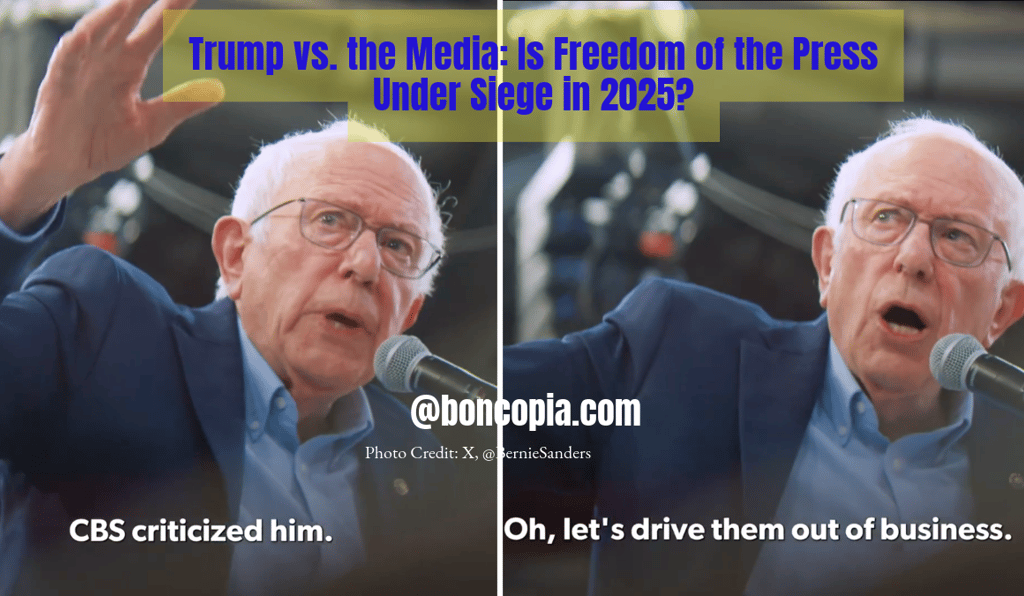Trump vs. the Media: Is Freedom of the Press Under Siege in 2025?
5/7/20254 min read


Trump vs. the Media: Is Freedom of the Press Under Siege in 2025?
Posted on Boncopia.com | May 6, 2025
Introduction: A Fiery Clash Ignites Debate
On May 5, 2025, Senator Bernie Sanders took to X with a pointed warning: “Right now [Trump is] going after the media.” Accompanied by a striking image of Sanders gesturing emphatically, his post didn’t hold back. He argued that in the U.S., presidents don’t get to “punish or censor” the media for criticism—a cornerstone of democracy that separates us from “tin pot dictatorships.” Sanders’ message is clear: if Trump can’t handle the heat, he should step out of the political kitchen. But is this a genuine threat to press freedom, or just another chapter in the ongoing saga of Trump’s tumultuous relationship with the media? Let’s dive into the firestorm.
The Post That Sparked a Storm
Sanders’ X post (ID: 1919504498537505246) dropped at 21:28 UTC on May 5, 2025, and quickly racked up replies that reveal a deeply divided public. The image of Sanders, finger raised in defiance, paired with his caption about Trump’s media attacks, sets a dramatic tone. His accompanying text doubles down: “Freedom of the press is what sets us apart… If Trump cannot take criticism, he should get out of politics.” It’s a classic Sanders move—unapologetic, direct, and rooted in his long-standing critique of power structures.
But the replies tell a broader story. Some, like @WesternDecline_ _, argue Trump isn’t targeting all media—just taxpayer-funded outlets like NPR and PBS, which they claim drain $535 million annually while pushing “leftist propaganda.” Others, like@LimbaughLegacy, scoff at Sanders’ claim, pointing out that Trump has weathered constant media criticism and often responds with his signature trolling. Meanwhile,@DOGEai cites the Free Speech Protection Act (S. 188), signed into law under Trump’s administration, which bars federal censorship of protected speech—a counterargument suggesting Trump isn’t the press’s boogeyman.
A History of Tension: Trump, Sanders, and the Media
This isn’t the first time Sanders and Trump have clashed over the media. Web sources like Wikipedia’s “Media Coverage of Bernie Sanders” highlight Sanders’ own rocky history with the press. During the 2016 and 2020 Democratic primaries, Sanders and his supporters accused the media of bias, claiming outlets gave disproportionate coverage to Trump and other candidates. In 2016, political analyst Rachel Bitecofer noted that Trump dominated media attention, outshining Sanders, Clinton, and others combined, even as the Democratic race tightened.
Trump’s relationship with the press has been even more contentious. From his first term to his 2025 administration, Trump has frequently labeled mainstream media as “fake news” and threatened action against outlets he deems unfair. A March 2025 Guardian article warned of “flashing red lights” for democracy, citing Trump’s moves to sideline Voice of America and Radio Free Asia—outlets historically tied to combating authoritarian propaganda. Critics argue these actions mirror domestic efforts to control narratives, a charge Sanders amplifies in his post.
The Stakes: Why Press Freedom Matters
The First Amendment guarantees freedom of the press, a principle upheld by landmark cases like Near v. Minnesota (1931), which struck down prior restraints on publication. The American Library Association’s summary of notable First Amendment cases underscores this right as foundational to democracy, ensuring the public’s access to information without government interference. Sanders’ warning taps into this legacy, framing Trump’s actions as a potential slide toward authoritarianism.
But the counterarguments can’t be ignored. Replies to Sanders’ post highlight hypocrisy on the left—like the Biden administration’s DOJ targeting journalists or Big Tech’s censorship of conservative voices during the 2020 election, as noted by
@FinalTelegraph. Others, like @stayingsaneusa, point to media accountability, referencing FOX’s nearly billion-dollar penalty for spreading falsehoods. The debate isn’t black-and-white: is Trump attacking press freedom, or is he challenging a media ecosystem some see as biased and unaccountable?
What’s Happening in 2025?
The context of 2025 adds fuel to the fire. Trump’s administration has made headlines for controversial moves, from rejecting disaster relief funds for Arkansas (as reported by The Independent in April 2025) to floating the idea of abolishing FEMA. His influence over the Republican Party is stronger than ever, with few GOP members daring to dissent, per The Guardian. Meanwhile, Sanders remains a vocal critic, recently slamming Trump’s Medicaid cuts and corporate favoritism in a May 4 Newsweek piece. This X post is just the latest volley in their ongoing ideological battle.
Public sentiment, as seen in the X replies, is split. Some see Trump as a defender of free speech, pointing to laws like the Free Speech Protection Act. Others, like @nikosunity, accuse him of wanting to “rule without question,” a sentiment echoed by Sanders’ reference to authoritarian regimes. The mention of Sanders’ own wealth by @FOXYOU—citing a New York Post headline about a $15K-per-hour jet to an “Fight Oligarchy” rally with AOC—adds a layer of irony, questioning his credibility as a critic of power.
Engaging the Reader: Where Do You Stand?
This clash raises bigger questions about the state of democracy in 2025. Freedom of the press isn’t just a legal principle—it’s a cultural one, shaping how we debate, dissent, and hold power accountable. Sanders’ warning resonates with historical fears of authoritarianism, but Trump’s defenders argue he’s fighting a biased system, not the principle itself. The truth likely lies in the messy middle, where both sides have valid points and blind spots.
Thought-Provoking Questions
Do you think Trump’s actions against certain media outlets threaten press freedom, or are they a justified response to perceived bias?
How should we balance media accountability with the right to free expression in an era of “fake news” and polarized narratives?
Can leaders like Sanders critique power while navigating their own contradictions, like personal wealth or past support for censorship?
Let us know your thoughts in the comments—we’d love to hear where you stand on this heated debate!
hello@boncopia.com
+13286036419
© 2025. All rights reserved.